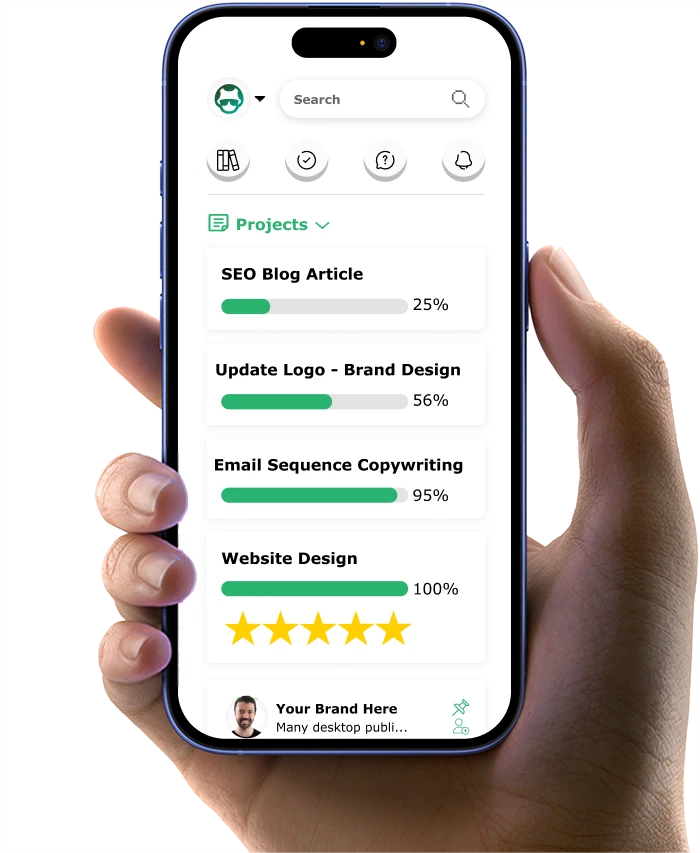Grow Your Agency: 8 Scenarios to Decide Between Freelance vs. Full Time

As you continue to grow your agency and scale your hiring funnel, you’re going to ask yourself many questions…
What should I charge my clients?
Should I even be offering this service?
What can I do to make my revenue more stable?
How do I bring on new talent to accelerate growth?
On the one hand, the answer seems obvious: just hire more people!
But…
Hiring = Headaches = Hassles.
But, when you actually try to scale your agency’s hiring funnel, issues pop up:
How do I find great talent?
How do I vet them?
And how do I determine the terms of our relationship—i.e., should they be full time, freelance, parti time?
Well, one of the things our clients are the most grateful for, is that Growbo takes the hassles of hiring off their plates.
So we’ve learned a lot about what’s needed for an agency’s hiring funnel to scale so that you can focus on growing your bank account.
And in today’s resource, I’ll tell you:
- The 4 scenarios where you need to hire freelancers for your agency.
- 4 scenarios where you need to hire full-time employees.
- And when it’s time for you to outsource your hiring needs.
Let’s begin. But first, there are 3 signs it’s time to start to hire new talent, and they are…
In a rush? Want to download this article as a PDF so you can easily take action on it later? Click here to download this article as a PDF guide.

3 Signs You Need To Grow Your Agency
But wait: before we tackle the details of hiring, let’s tackle the details of when it’s appropriate to hire—because it’s not always as obvious as you may think.
Although it may sound obvious, the biggest signs that you need to grow your workforce is if the following three conditions are met:
- Revenue is going up.
- Profit is going up.
- Demand is going up.
How could any of those things exist without the other two, you may ask?
Well, if you’re running a sustainable business with a solid pricing model, they shouldn’t. But, many entrepreneurs aren’t doing this.
If you find that your revenue is increasing but your profit is stagnating, or that your demand is going up, but your revenue and profit aren’t going up, you’re doing something wrong, and this needs to be addressed before you think about growing your team or operations.
The way you approach your pricing and service offerings is usually the core of the problem. You can’t grow if your margins are too small, if you’re relying on one or two massive clients to carry your entire business, or if you’re going through feast and famine cycles of workload and revenue.
To confront these problems, you need to set up reliable, sustainable methods to manage your business and finances. For agencies, this should include:
- Carving out an appropriate niche.
- Utilizing a pricing model that results in consistent cash flow. This may involve switching from hourly rates to monthly rates or introducing contracts. (To learn more about pricing models, check out this article.)
- Having repeatable workflows and methods of delivering results. Customized services for each and every client simply isn’t scalable, in most cases.
When you’ve done the work to ensure all these needs are met (to the extent that you can), you can start thinking about hiring new talent.
The Pros and Cons of Freelancers

There are many smart reasons for agencies to hire freelancers. Here are a few of the most common ones.
Freelancers are a popular option for agencies looking to grow their workforce without taking on too much commitment. Freelancers offer more of an on-demand relationship compared to full-time employees, which make them a more flexible, forgiving solution—especially when it comes to short-term projects.
However, it’s important to understand the limitations of working with freelancers. It can be hit or miss regarding whether they’ll have the same level of reliability and expertise as full-time employees. They also won’t have the same level of vested interest in your business’s success.
4 Scenarios When It’s Appropriate To Hire Freelancers
1. You’re Just Starting Out
Although it’s important to have all your ducks in a row before you hire, with freelancers, it’s less important—they’re not necessarily looking for or expecting a long-term relationship and are okay with parting ways whenever you have lulls in work or don’t need their skill set anymore.
That’s why freelancers are great for agencies that are just starting out and need a few extra hands on a project-by-project basis.
This will give you the flexibility to get experienced professionals on board when needed, without having to pay them salaries and worry about how they fit into the long-term vision of your company.
2. You Have a Temporary Project
Many agencies, especially when they’re new or haven’t quite gotten their footing yet in terms of their niche or offerings, go through feast and famine cycles. One month, you may be making $10,000s in revenue, while the next month, you may be making close to nothing.

As you cycle through completing projects, you may find yourself in a spot where you have no work at all.
Or possibly, you have a giant contract with one client, and then as soon as that ends, you have no work and need to scramble to find a new one.
In these situations, full-time employees are an extra stressor you simply don't need — especially if this is the de facto way your agency is running.
Instead, it’s often helpful to bring on freelancers for a specific job or two, and you can part ways once the project is complete. Then, when your next client pops up, you bring them on again just as easily, find someone who’s a better fit, or decide you never need someone with that skill set ever again. It’s up to you.
3. You Have a Temporary Skills Gap
Depending on what services or products you offer, you may need very specific skill sets or expertise to complete a project. It could be web design one month and video production the next—and you may not have any employees that know how to do both.
In this case, it’s helpful to hire freelancers who can fill those gaps in skill sets when needed. That way, you don’t need to take on full-time employees while you’re still figuring out whether to offer a service as a full-time part of your business model.
Keep in mind that this scenario isn’t just for agencies who are starting out. As your business changes and grows across its entire lifetime (which it should be doing), it’s normal to test out new services and ways of packaging your offer. In these situations, freelancers, or potentially even contract-to-hire employees, are ideal for test-driving whether it makes sense to offer a certain skill set.
4. It’s All Your Budget Allows
Finally, if you’re just not in a financial position to hire full-time employees (and may not be for quite some time), then freelancers are the way to go.
This is especially true when it comes to projects that don’t necessarily demand full-time attention—such as skill sets and responsibilities that are more on the edge of what you offer and clock in 20 hours a week or less of your current team’s time.
For example, an agency that deals primarily with design may find that they occasionally need a copywriter to come in and tweak some words around—but they don’t need this enough to justify hiring a full-time copywriter.
When there’s no need for a full-time team member to be 100% dedicated to a responsibility, it makes much more sense to hire a freelancer and save your full-time positions for skills that require more day-to-day attention.
Want the flexibility of freelancers without having to deal with the hassles of hiring them? Growbo.com is a full-service, white label software that can help you delegate unlimited marketing projects to a talented team without the headaches of hiring. Get started today or book a call to learn more.
The Pros and Cons of Full-Timers
On the other hand, if you’re looking to take on a permanent additional fixed cost and build a team that is in it for the long run, then it’s time to start considering full-time employees.
Full-timers are great when you have some stability, know what your overall business goals are, and have a tried-and-tested method for achieving them.
Although they come with more upfront investment, they can save you time in the long run compared to freelancers by acting as a reliable, long-term asset to provide a service you need. And, as time goes on and full-time employees learn more about your company, their role, and expand their own skills, they only work to serve you better.
The downside to full-timers is that they demand a lot of responsibility on your end. When you have full-time staff, it’s your responsiblity to ensure they can support themselves. That means you owe it to them to keep your business afloat and to keep their role in demand—which requires having a long-term plan for the stable and sustainable growth of your company. They also tend to cost more than freelancers.

Full-time employees often cost more than their salaries—which is something you need to calculate into your larger financial picture.
4 Scenarios When It’s Appropriate To Hire Full-Time Talent
1. You Have a Consistent Need for Their Skills
If you have a service you provide on an ongoing basis, and it doesn’t appear to be affected by large fluctuations in demand, then it’s probably time to bring in full-time talent. That way, they can work on perfecting their craft and area of expertise while being available whenever the need arises.
For example, if you’re an agency that specializes in content marketing, you’re going to need full-time writers, editors, and perhaps even a project manager or team lead to keep everything organized and on track. These are must-haves to keep your business going, and if you stop needing them, it’s likely that your entire business is in trouble.
So, instead of wasting time juggling different freelancers, take the leap and hire full-time talent to help you handle these daily tasks. They’ll reward you in the long term with a higher quality of work and less oversight required to do their jobs correctly.
2. You Want Better Control Over Your Projects
If you’re looking for more control over the projects that your team is working on, then full-time employees are the way to go.
With freelancers, there’s often a disconnect between what they think they should be doing and what you need them to do—leading to long back-and-forth conversations and potential delays in getting work done.
This is mostly caused by the nature of a freelancer relationship: You’re one of their many clients, and they’re simply not familiar enough with your business or your needs to deliver work that fits the exact requirements you’re looking for.
Full-time talent, on the other hand, gives you the ability to have direct control over the work they produce. In addition to giving them clearer, more detailed intructions they can implement across many different projects, you also have the ability to manage their performance, set expectations, and give feedback on their work.
3. The Kinks of Your Busines Model Are Ironed Out
If you’ve been working as an agency for some time and have figured out what your offerings are and how to package them in a repeatable, reliable way, then it’s probably time to think about bringing on full-timers.
This is the point where your business model has been refined and tested to the point that the kinks are ironed out—and you can go ahead and make the necessary investments to scale up operations.
Full-time employees are a crucial part of that process since they give you the head count needed to handle larger projects and increase your output—while also giving you the stability needed to keep overhead costs in check.
Just remember: It’s important to make sure you have the right people on board, so be clear with what you’re looking for and make sure to put systems in place that guarantee their ability to deliver. That way, you can ensure your investment pays off in the long run.
4. The Kinks of Your Finances Are Ironed Out
Although your finances are intertwined with your overall business model, it’s worth calling them out specifically.
If you’ve got a good handle on your finances—meaning you have a steady stream of income, profits are sustainable, and it’s nearly impossible to lose money from any of your operations—only then should you think about taking the plunge into full-timers.
This is because, as mentioned previously, hiring full-time employees creates an additional fixed cost that needs to be taken into account when budgeting and forecasting your finances.
So if you’re confident in the financials of your business, then it’s time to start looking for full-timers who can help you scale and grow. Just make sure to put proper systems in place for managing payroll and benefits so that you don’t end up overspending on these costs.
Want to skip the hiring hassles of dealing with freelancers and full-time employees? Growbo.com lets you have the best of both worlds by letting you delegate unlimited marketing tasks to a full team of pros with 16 different skill sets — all within a few clicks on our easy-to-use web app. Get started today or book a call to learn more.
What About Outsourcing to Other Agencies or Service Providers?
Finally, there’s one last option we haven’t talked about yet: outsourcing to other agencies or service providers.
Many agencies, especially large ones, choose to outsource an entire sector of their operations entirely—whether it’s SEO, writing, design, or even something more internal like payroll and accounting.
The benefit of doing this usually has to do with the fact that instead of having to deal with hiring and managing an entire new department, you simply have to deal with one point of contact that connects you to a larger collection of people who do the work for you.
This is an easy route when it comes to more technical skills that you need but don’t want to fully integrate into your business because of how time-consuming or complex they can be. For example, many choose to outsource coding projects or SEO since these are fairly detailed skill sets that are somewhat besides the point to the main goal of many agencies’ services.
However, the downside to outsourcing is similar to the downside of using freelancers. You’re betting on trusting that the other party can get the job done and won’t break client confidentiality or mess up the project. While this shouldn’t be a problem when you’re working with reputable companies, it can be a major concern if you choose to outsource to shoddy, unprofessional operations.
So, outsourcing to other agencies is ultimately up to you—if you feel its best for you development and growth, give it a try. But remember, you are relinquishing a certain amount of control and ownership over the project. And if you choose the wrong agency to work with, you may end up with a liability rather than an asset.
Conclusion
Download the “Grow Your Agency: 8 Scenarios to Decide Between Freelance vs. Full Time” so you won’t forget to take action on it later. Click here to download it now.

A more detailed breakdown of different hiring options—including some factors I haven’t mentioned here.
If you want to grow your agency, you’re going to have to hire someone sooner or later. Both freelancers and full-time employees are great options, but they’re appropriate to different scenarios.
As a reminder:
- Freelancers are great for new businesses with inconsistent workflows, projects, or profits. They involve creating a more casual relationship suited for a more flexible environment.
- Full-time talent is great for more established businesses with stable growth, reliable workflows, and a steady stream of cash and projects. Full-timers require more responsibility to work with and are for more long-term relationships.
- You should only hire new team members if your finances and business model are in order. If they aren’t, disaster may be imminent.
What’s your experience with freelancers and full-time employees? Which do you prefer?
Let me know in the comments below.
Keep Growin’, stay focused.














